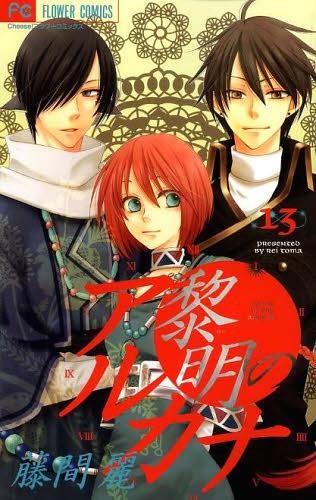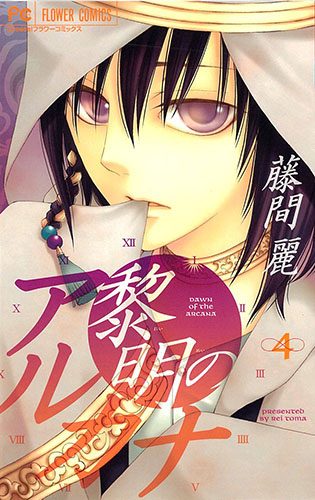
Nakaba Is No One’s Damsel in Distress
- Mangaka : Touma, Rei
- English Publisher: : VIZ
- Genre : Drama, Fantasy, Romance, Shoujo
- Published : December 2011
Reimei no Arcana Introduction
Two rivaling kingdoms wed their prince and princess in order to stop a long and brutal war, but there is no love in either of their hearts. Prince Caeser considers Princess Nakaba nothing more than a toy and delights in harassing her. Despite being a princess, however, Nakaba has not led an easy life and Caesar’s cruelty is neither unexpected nor new to her. With only her loyal servant Loki at her side and a mysterious power slowly awakening inside her, Nakaba strives to create the peaceful world she dreams of no matter who stands in her way. This rebellious and determined side of her may also be the key to changing Caesar’s hesitant heart.
Contains Spoilers
Discussion Time
The manga begins with the ominous words “Today, I belong to the enemy.” This sentence prepares the reader for the less-than-fantasy royal romance that awaits our heroine. Even as the first few pages show a handsome prince Caesar speaking kindly and being cheered on by the crowd, we’re given a sense that things are bubbling just below the surface. In this world, royals all have beautiful black hair and other colors of blond, brown, and red designate a commoner or worse, ajin. Despite being a princess, Nakaba was born with red hair which has made her a target all her life. Indeed, it doesn’t take long for Caesar to start hurting and insulting Nakaba away from the eyes of the public. This seems like it might be another “hapless good girl needs to change the heart of a beast” kind of story but we’re in for a surprise. While she’s accepting of the dangerous situation she’s in, Nakaba refuses to be a pushover, going so far as to calmly punch her new husband for insulting not only her but her ajin servant Loki. As Caesar violently chokes her, threatening to behead her, Nakaba tells him with steely eyes that it makes no difference to her. She was treated the same way in her own country as she will be here, and the only difference is where she will die. Dinner with her in-laws sheds a little light on why Caesar can be so callous as his mother calls Nakaba a disgrace and the king of Belquat slices Loki across the chest thinking he picked inappropriate clothes for Nakaba. The sight of blood causes Nakaba to see the past; the time when this same king ordered a village of ajin to be slaughtered when Nakaba was just a baby. Loki disappears as the king orders his men to find and kill him and Nakaba passes out.
Later, Caesar teases Nakaba that Loki will never return to her despite her faith that he will. They make a wager that if he does not return by the morning, Nakaba forfeits her life but if he does, Loki will be completely pardoned for his crimes of raising steel in front of the king. While they are waiting, Caesar attempts to force himself on Nakaba who then cuts him with a hidden knife. This excites Caesar and he only stops when Loki does indeed return and presses his own knife to Caesar, begging Nakaba to let him kill the arrogant prince. It’s clear Nakaba and Loki’s relationship transcends master and servant and that they would both die or even kill for each other. Caesar has only known people who fear him or wish to use him, so their relationship really upsets him. He does indeed intend to keep his word. For all his failings, Nakaba sees potential for good in him. She knows well that hatred in parents can manifest in their children and she tells Caesar she trusts him.
A festival with a jousting tournament is made to celebrate the new royal marriage leaving Nakaba completely disinterested. She remarks on how gaudy the whole event is and that the resources could have been put to better use. Instead of defending that the royal family can use the people’s money however they like, Caesar explains that as a princess, she should know how important these events are for the people by helping the economy and giving them something to look forward to. The joust nears its conclusion with Caesar and his crowned-prince brother, Cain. Nakaba has a sudden premonition of Caesar’s death and finds herself grabbing him and telling him not to go. He knows Nakaba has no reason to want him alive after how he treated her but is moved she still doesn’t want him to die.
After defeating Cain, Caesar asks any who dare to challenge him, and Loki appears. In front of the king, Loki asks that he may be pardoned if he should best Caesar, which he does. The king seems rather emotionless about the ordeal but Loki is allowed to return to Nakaba’s side.
After witnessing a tender moment between Nakaba and Loki, Caesar thinks that Nakaba’s bravery and resolution was just a trick like every other girl he’s met and she’s only swooning after the strongest man. Yet once she sees him, Nakaba happily runs over without a hint of shame or secrecy and tells Caesar that if he keeps trying, he might win next time. She has no idea how much this means to Caesar whose own parents never expected anything of him or encouraged him to try, simply hoping he would hide his shortcomings and use others to his advantage. Knowing there was someone in the world who believed in him and wanted him to be happy for his own sake, Caesar embraces Nakaba.

The Characters Start to Fall for Each Other for Good Reasons
Many romance manga have a guy and girl falling for each other for just a show of kindness or because one of them is surprisingly attractive. It can often feel forced and unnatural but Reimei no Arcana avoids this in two ways. First, we can see through Nakaba and Loki’s loving relationship that Nakaba is not as closed off as she appears. When she trusts someone, she’s incredibly kind and thoughtful so it would make sense she would show kindness to Caesar as she begins to understand the kind of person he is without his horrible parents’ influence. While tough and unwilling to relent in her beliefs, Nakaba isn’t cold and uncaring nor is she naïve. She respects Caesar’s own conviction but she isn’t moved to love immediately. It also avoids the stereotypical ‘a girl said no to me for the first time, so now I’m in love’ trope. The reason Caesar begins to develop feelings for Nakaba is that she is one of the only sincere people Caesar has ever met and because she believes in him. He knows she cares more about her convictions than her own life, so he doesn’t have to fear Nakaba using him or hating him for not behaving as she wants.
You Only like Drama in Terms of Miscommunication or Surprise Fiancés
While there are also those common dramatic scenes where something is taken out of context and, of course, fiancés are causing problems, there are a lot more serious problems. Villages are slaughtered and there’s an image of children dead in the snow that you just saw playing happily mere pages before. Nakaba and Loki are sent to a place where they know their very lives mean less than keeping the peace and no one cares what happens to them after the wedding to Caesar.
Final Thoughts

In volume 1, we get a sense that politics will come to play a heavy role in the series, but we only see Nakaba’s unpopular opinions about equality being ignored. With only little flashbacks to other areas, we don’t know about the world of Remei no Arcana at large and just how far from the castle the story will take us. We also don’t know if Loki will remain a good servant or if a love triangle will form as Caesar finds himself falling for Nakaba! What we do know is we have a great set up for a magical story and we can’t wait to see how Nakaba’s powers develop.
Recommended Post


